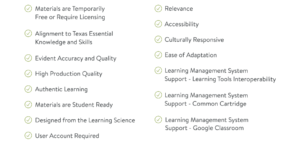Scaling Formative Assessment: The How I Know Project

“I think it’s very important to have a feedback loop, where you’re constantly thinking about what you’ve done and how you could do better.”
-Elon Musk
Musk’s quote makes sense. For life. For business. For learning. The question is, how prevalent are feedback loops in the classroom? Do we create an environment in schools where teachers and students are constantly thinking about what they have done and how they can move forward?
At Getting Smart, we have talked about how formative assessment is integral to the learning process. We know that happens best when we create a culture of revision – where all students feel safe, know what is expected and are part of a continuous improvement process (which includes both successes and failures).
In partnership with the Michael & Susan Dell Foundation, three school districts and several learning organizations, we are excited to kick off the How I Know project, which is focused on formative assessment.
###
The following blog was written by Cheryl Niehaus and is posted on the Michael & Susan Dell Foundation blog.
 On a daily basis, students need to know how they are doing and teachers need to know how to move learning forward. That is the gist of effective formative assessment practice, which is a critical component of meaningful instructional practice. It puts students at the center of their learning, with teachers leading the way.
On a daily basis, students need to know how they are doing and teachers need to know how to move learning forward. That is the gist of effective formative assessment practice, which is a critical component of meaningful instructional practice. It puts students at the center of their learning, with teachers leading the way.
We know that well-implemented formative assessment practice can support students and teachers to improve learning outcomes. In 2015, we commissioned a study with Education First to gain a better understanding of how educators were using formative assessment practices in their classrooms. It involved working with teachers in the Austin, Denver and Metro Nashville school districts to learn how, and how well, teachers in these districts use data to inform instruction on a daily basis.
One big learning from the study? Teachers generally have positive beliefs about the importance of incorporating formative assessment practices into their regular routines. But this same study also showed that there is significant variation in teachers’ effectiveness as they work to implement formative assessment practice.
And so the challenge for us in the field is this:
Knowing that traditional approaches to professional development too often do not result in sustained changes in classroom practice, how might we systematically support teachers to develop into exemplary formative assessment practitioners?
To address this challenge, we brought together Education First, Getting Smart, WestEd, and Brookhart Enterprises to implement the “How I Know: Designing Meaningful Formative Assessment Practice” project. Three districts – Austin Independent School District (ISD), Dallas ISD, and Tulsa Public Schools – have committed to the two-year initiative. Collectively, this network aims to identify, scale and share successful approaches to improve formative assessment practice in classrooms.
This project will:
- Convene a network of 60 educators across three districts
- Coach educators to understand the strengths and opportunities in their current formative assessment practice
- Create and pilot a range of professional learning models to support teachers in becoming exemplary practitioners
- Share lessons learned from pilot classrooms with the field
Over the next two years, we will be telling the stories of these educators, sharing lessons learned and taking a deep dive into the practice of Formative Assessment. We invite you to follow this journey and learn alongside us as we gain an even better understanding of the practice of Formative Assessment. We have established a website to help tell this story:
How I Know Website
If you’re interested in starting your own formative assessment progress, we also want to hear from you. Please leave a comment at the end of this blog, and be sure to visit the How I Know website to learn more and to access formative assessment resources. For more, see:
- Better Formative Feedback: Work Worth Doing in a Place Worth Being
- And check out these school districts:
This post is part of a series focused on the “How I Know: Designing Meaningful Formative Assessment” initiative sponsored by the Michael & Susan Dell Foundation. See the How I Know website and join the conversation on Twitter using #HowIKnow or #FormativeAssessment.
Stay in-the-know with all things EdTech and innovations in learning by signing up to receive the weekly Smart Update. This post includes mentions of a Getting Smart partner. For a full list of partners, affiliate organizations and all other disclosures, please see our Partner page.






Patti Shade
And it doesn’t have to be complex. A favorite phrase in CBL classrooms - “tell me your thinking” during formative student-teacher mini conferences. Next steps: self-assessment and peer review!